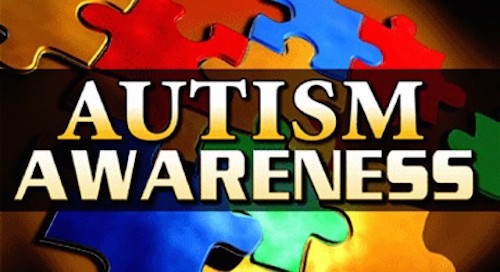How I Became an Aspergers Advocate for Teens

Photo Via Flickr – by Kentucky National Guard Public Affairs Office
Different Dream is pleased to welcome today’s guest blogger, Kathleen Carter. She’s here to explain how she became an Asperger’s advocate for teens around the country. Her story is fascinating, encouraging, and convicting as her perseverance and creativity on her road to advocacy puts many of us to shame. See what you think.
How I Became an Aspergers Advocate for Teens
I remember being in elementary school when I realized that I was different from my classmates. I was paired up with another student, and I just couldn’t figure out how to get him to understand me. Frustrated, I began wringing my hands—a motion I used to do often because it would calm me—which led him and his friend to make fun of me.
As I got older, I learned more about my Aspergers. And though it has taken me a while to reach this conclusion, today I don’t think having Asperger’s is a bad thing. Not at all. In fact, in recent years, I’ve developed a sense of pride when it comes to my AS. I know that it makes me different from some other kids, but it also gives me something in common with the other wonderful people on the autism spectrum.
I wanted to help other kids with Aspergers to feel the same pride that I did while also educating my peers about it, but I wasn’t sure how to get started. Through trial and error, I figured it out. If you’re a teen with Aspergers, I highly encourage you to follow in my footsteps. It’s important that everyone on the autism spectrum know what they can achieve. Here’s how I became an Aspergers advocate:
I became an Aspergers advocate by becoming more independent.
When I started high school, my mom thought it was time for me to learn skills that would make me more independent. In this article from Autism Aspergers Digest, the writer provides tips for teaching independence skills and touches on the positive results that come with those skills. For example, in addition to learning the skill, the child with Aspergers gets a confidence boost from being able to do the new task and also has a great sense of wellbeing because they’re learning to take care of themselves in all aspects of life.
My mom and I placed a big focus on cooking. We went through many of her best recipes and now I can make each one. As I conquered those challenges, it made me think about what else I could achieve, and that gave me the spark I needed to create a plan for becoming an Asperger’s advocate.
I started swimming to become an Aspergers advocate.
Building self-esteem has always been a problem for me. Bad experiences with bullies in elementary and middle school really took their toll. That is, until I started swimming. Swimming became a part of my life when I started high school. I started it as a way to become more physically healthy—it’s actually a great form of exercise, in general, for people on the autism spectrum. As this article shows, people with autism can see many benefits when they swim—improved health, better attention spans, improved social skills, and so on.
And while I did certainly get more fit, the real bonus was the boost in confidence it gave. It turned out to be something I was good at and enjoyed. It also gave me a chance to work on interacting with people my age. As I got more comfortable around them, I began to realize that if I worked hard I could get better at communicating with my peers and adults. Without swimming, I don’t think I would have had the confidence to move forward with my plan to become an advocate.
I became an Aspergers advocate by working with an occupational therapist.
As I mentioned above, I’ve always had difficulty communicating with my peers. Especially in elementary and middle school, I’d be so desperate for my classmates to like me that I would experience extreme anxiety whenever I was in social situations. To help me become a better communicator, I worked with an occupational therapist. The Asperger/Autism Network explains how occupational therapy (OT) benefits people on the autism spectrum. Essentially, OT helps develop every day skills—in work, leisure, school, etc. My therapist and I worked on developing my communication skills in different settings. It has helped me immensely as I’ve started to speak to people more and more about what it’s like to be a teen with Aspergers.
Of course, each of these steps points to one achievement—building my confidence. Without that boost, I don’t think I’d be doing what I’m doing today. And I’m incredibly grateful to my parents and everyone else who has helped me make this happen. I love telling people about what it’s like to have Aspergers, and I hope I can keep doing it for a long time to come.
Leave a Comment for Kathleen
Did Kathleen’s story impress you? Feel free to leave a comment to encourage her or a question generated by her story. And of course, your ideas about how to become a special needs advocate are always welcome. Thanks!
Do you like what you see at DifferentDream.com? You can receive more great content by subscribing to the quarterly Different Dream newsletter and signing up for the daily RSS feed delivered to your email inbox. You can sign up for the first in the pop up box and the second at the bottom of this page.

By Kathleen Carter
Kathleen Carter is a teen living with Asperger’s Syndrome. She enjoys educating her peers and others about AS. She does so by writing proudly about how her life differs from other people her age. She is so grateful to have the opportunity to write for EducatorLabs.
6 Comments
Submit a Comment
Subscribe for Updates from Jolene
Related Posts
What’s Working on Your ADHD Journey?
Guest blogger Lisa Pelissier provides ADHD management tips from her own journey and asks, “What’s working on your ADHD journey?”
Enjoying the Holidays with a Food Allergy
Jolene talks about her own family’s struggles and explains her strategies for enjoying the holidays with a food allergy.
God’s Plans for our Children are Like a Puzzle
God’s plans for our children are like a puzzle larger than any Sandy Ramsey-Trayvick has ever completed. In today’s post she describes how putting together jigsaw puzzles had shown her to trust in God’s plans for her kids. I began doing jigsaw puzzles again while we...






Thanks for stopping by to encourage Kathleen. She’s such an encouragement to others, as you are. Jolene
Beth, you said that beautifully. I agree 100%. Kathleen is an amazing young woman.
Glad to hear from you, Anna!
You are an amazing young woman and I have no doubt that you’ll be successful in every challenge you take on! Thanks for sharing your story with us and thanks for becoming an autism advocate!
Kathleen you are a very impressive young woman. Thank you for sharing your story here and with others!
From a fellow teen advocate, hello!